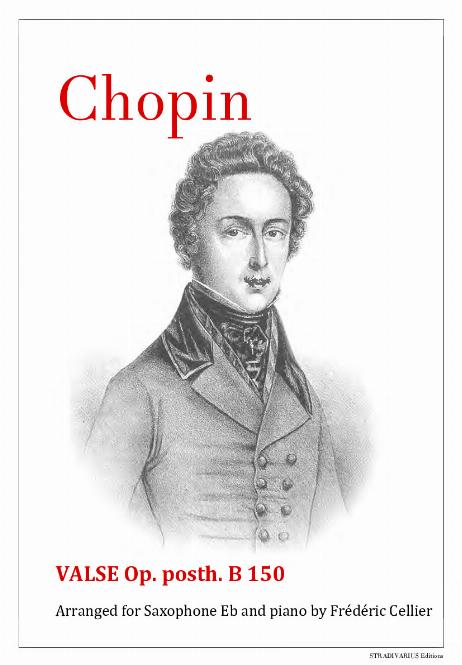- Voice
- Keyboard
- String
- Woodwind
- Brass
- Library
 $ 6.99
$ 6.99
1843
Saxophone Eb and piano
Arranged by Frédéric CELLIER
Duration ≃ 01:50 | Difficulty ≃ 7/10
$ 6.99
SCORE Saxophone Eb and piano
PDF - 4 pages
+
PART Saxophone Eb
PDF - 2 pages
Composed for solo piano around 1848, this work was not published during Chopin's lifetime, but only eleven years after his death, in 1860, as 3rd of the Four Pieces for piano signed by Baroness Charlotte de Rothschild (1825-1899).
Charlotte de Rothschild was the daughter of Baroness Betty de Rothschild, a prominent Parisian housewife who introduced Chopin to Parisian society by inviting him to play in her salon as soon as he arrived in Paris in 1831. Chopin became the piano teacher not only of Betty, but also of Charlotte and her cousin Hannah Mathilde. Thus, from 1840/41 to 1849, Charlotte was taught by Chopin both in piano (she is the dedicatee of the Ballade N°4 Op. 52 and the Valse Op. 64 N°2) and composition.
While it is possible that both the Waltz Op. postume B 150 and the Nocturne in C minor B 108, which respectively form the 3rd and 1st of the Four Pieces for piano signed by the Baroness, were the subject of compositional work between her and her teacher, it is obvious, given their high quality and characteristic style, that the latter participated more than generously.
Bequeathed in Charlotte de Rothschild's will to the Conservatoire Library, their manuscripts bear, in fact, only the Polish composer's handwriting.
Finally, the mediocre pieces N°2 and N°4 that awkwardly complete this collection, a Polka in C minor and a Waltz in F minor, do not appear among this legacy of manuscripts by the Polish composer, which supports, if proof were needed, the hypothesis that they are not from his pen, but from that of the Baroness, of far inferior quality.
These are the conclusions reached by musicologists specializing in Chopin's work, which led them, in 1938 for the Nocturne in C minor B 108 and in 1955 for the Waltz Op. postume B 150, to officially add these two compositions to his catalog.
The short Valse Op. postume B 150 was immediately adopted by pianists and music lovers the world over, seduced by its simplicity, the modest sadness of its first theme, the popular, almost Tyrolean gaiety of the second, and the melancholy nobility of its abrupt coda.
Along his university studies (DEA in musicology, University of Paris IV-Sorbonne), Frédéric Cellier was awarded three first prizes and a development prize at the CNR of Nice and won first prize at the International Competition of Musical Execution - soloist category – of Stresa (Italy).
He is the laureate of the Fondation de France and the Yehudi Menuhin Foundation and accredited teacher at the CNR of Nice, the CNR of Marseille, and at the CRR Olivier Messiaen of Avignon (France).
Frédéric Cellier is the interpreter of Francis Poulenc’s Sonata for clarinet Bb and piano with Jean-Michel Damase, Jean Françaix or Gabriel Tacchino, but also performs his own version for clarinet, piano and string orchestra of George Gershwin’s Rhapsody in blue for Wynton Marsalis or under the baton of Adrian Gershwin, grandson of the composer.
Founder and artistic director of STRADIVARIUS Editions, he is the author of pieces of light music and a considerable number of arrangements in all styles and for all instruments acclaimed by numerous personalities in the music world:
"Frédéric Cellier has produced a number of adaptations of Georges Auric's works with such talent and precision that I consider them a natural addition to his chamber music catalogue."
Michèle AURIC - Georges Auric's widow
"To Frédéric Cellier, excellent musician and tireless arranger."
Jean FRANÇAIX - Composer and pianist
"Arranging a musical work is always a delicate and risky exercise, because it requires both modifying it so that it can be played by the desired instruments and preserving its very essence. But that is exactly what Frédéric Cellier has done, preserving the nuances, subtleties and soul of the original works while breathing new life into them.
His arrangements give all the musicians the chance to perform these compositions specially revisited for their instrument, and make music lovers rediscover them in a new light."
Adrian GERSHWIN - George Gershwin’s grandson
"Congratulations for your beautiful new orchestration and rendition of Gershwin’s Rhapsody in blue."
Wynton MARSALIS - Trumpet player, composer, bandleader, general and artistic director of Jazz at Lincoln Center, New York
"It is outstanding that Frédéric Cellier has managed to transpose Saxophone Marmalade from the saxophone to the clarinet. I thank him for it and wish its great and deserved success. "
Manuel ROSENTHAL - Conductor, composer and Maurice Ravel’s pupil
"I am very happy to tell you how much I appreciated your transcription of the Capriccio, based on Francis Poulenc's Le Bal Masqué. It perfectly reflects the spirit and verve of the score for two pianos that I had the opportunity to play and record with Jacques Février, and it was a great pleasure for me to premiere it in Montpellier."
Gabriel TACCHINO - Pianist, Francis Poulenc’s specialist
"I must tell you that I really like your transcriptions and that I think the tone of the instruments you have chosen suits perfectly our beloved composer."
Ornella VOLTA - Musicologist, president of the Erik Satie’s Foundation
Added to your basket

Removed from your basket

Added to your favorites

Removed from your favorites

You must be registered to use this function

You reached the download limit for free products (5 per day)
